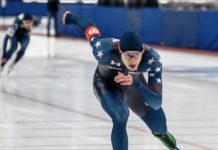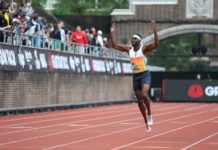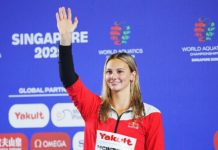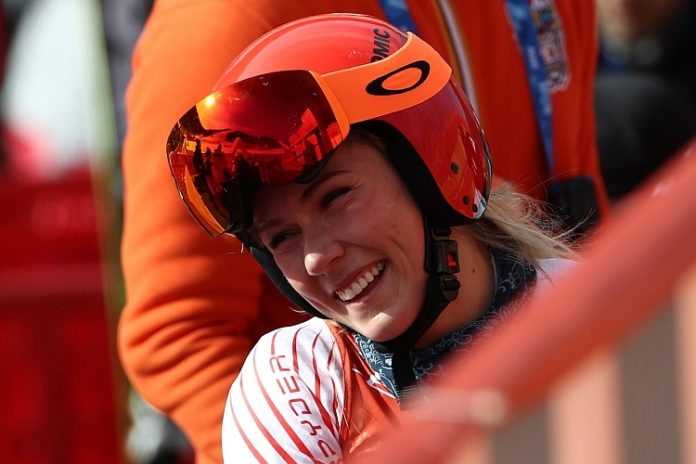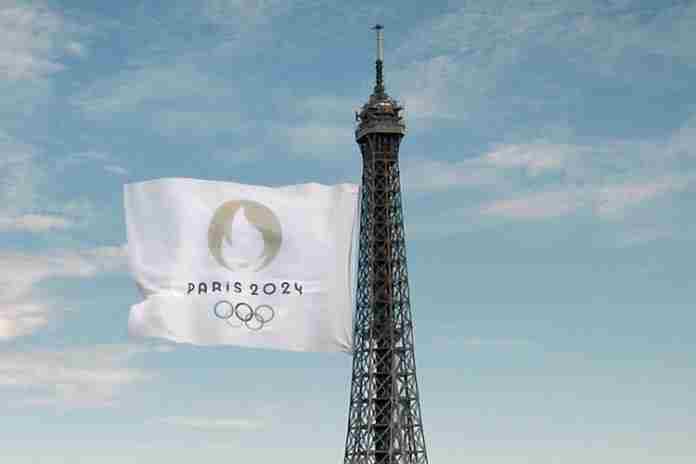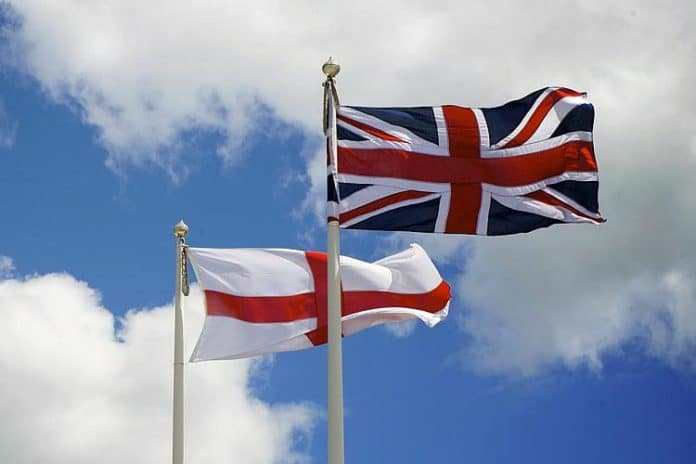★ The Sports Examiner: Chronicling the key competitive, economic and political forces shaping elite sport and the Olympic Movement.★
★ Thank you to now 14 donors, who have covered 37% of our technical expenses for the first half of 2023. Please consider a donation. Thank you in advance. ★
★ To get The Sports Examiner by e-mail: sign up here! ★
● Sponsored post: All about the RR Auction on now: An Athens 1896 medal in its original box, 38 Olympic torches and 40 Olympic medals, ending 19 January ●
● David Miller’s guest column, A Paris Olympic Boycott Threat, is available here. ●
≡ THE 5-RING CIRCUS ≡
1. Shiffrin wins in Kranjska Gora, ties Vonn as no. 2 all-time
2. Paris 2024 Opening Ceremony prices: €90 up to €25,000!
3. Chamonix not interested in 2030; Sapporo support at 33%!
4. Politics in play as Brisbane 2032 infrastructure deal stalled
5. WTA return to China needs “resolution to the Peng situation”
The amazing Mikaela Shiffrin scored her 82nd career FIS Alpine World Cup win on Sunday in a Giant Slalom at Kranjska Gora, Slovenia, tying fellow American Lindsey Vonn for the most wins ever by a woman in World Cup history. Shiffrin, still just 27, is only four behind Swede Ingemar Stenmark for the most World Cup wins ever, at 86. A French newspaper report says that tickets for the Paris 2024 Opening Ceremony will go for as low as €90 for seats on platforms on the side of the River Seine and for as much as €25,000 for a spot on the river itself on a cruise ship! Most spectators – perhaps 500,000 more – will be able to watch for free from the roadsides above the river. The mayor of Chamonix, France said the town is not interested in being part of a tri-nation bid for the 2030 Olympic Winter Games suggested last Friday. A new poll in the Hokkaido Shimbun said that 67% of area residents are opposed to a Sapporo bid for the 2030 Winter Games, leaving Salt Lake City as the only viable 2030 option for the International Olympic Committee at present. In Brisbane, Australia, no agreement has been made between the Queensland government and the national government on funding for infrastructure programs related to the 2032 Olympic Games, notably the renovation of the Brisbane Cricket Ground, known as “The Gabba.” Opposition party leaders are calling for the state and national governments – who are both governed by the Labor Party – to get going. The Women’s Tennis Association repeated its demand that the sexual assault allegations made by former women’s Doubles star Peng Shuai be investigated before any discussion can be had on reinstating tournaments in China.
1.
Shiffrin wins in Kranjska Gora, ties Vonn as no. 2 all-time
“I can’t believe it.
“I was so nervous this run, I have a rash on my face because I was so nervous. I don’t know why, maybe a little bit was because of 82. I really wanted to ski it well, and I did.
“I hope some day I can ski like that again because it was maybe the best thing I ever did in a GS.”
That’s American skiing superstar Mikaela Shiffrin, who won the second Giant Slalom race at Kranjska Gora (SLO) on Sunday for her 82nd career World Cup win, tying her with fellow American Lindsey Vonn for the most ever by a woman and no. 2 all-time behind only Sweden’s Ingemar Stenmark (86).
Shiffrin had a five-race win streak snapped on Saturday as she finished sixth in the first Giant Slalom race, behind winner Valerie Greiner (CAN: 1:55.01) – who scored her first World Cup victory – then Italian star Marta Bassino (1:55.38) and Slovakia’s Petra Vlhova (1:55.41).
On Sunday, Shiffrin was on fire from the start, posting the fastest first run at 55.30, up by 0.24 over Federica Brignone (ITA), then won the second run at 57.23 for a 1:52.53 total. Brignone, the Beijing 2022 silver medalist in this event, was second at 1:53.30 and Swiss Lara Gut-Behrami came from fifth to third on her second run with a 1:53.50 total.
Shiffrin’s 82 wins came come mostly in the technical events – Slalom (51), Giant Slalom (17), Parallel Slalom (2) and City Events (3) – but also in the Super-G (5) and Downhill (3), along with one in the Combined. The FIS report also noted Shiffrin’s amazing win rate:
● Shiffrin won her first World Cup race at age 17 in December 2012 and has taken only 233 starts to reach 82 wins: one victory for every 2.84 starts.
● Vonn won her first World Cup race at age 20 and her last at age 33, winning once per 4.82 starts over her 395-race career.
Shiffrin, still just 27, will be the favorite for win no. 83 on Tuesday (10th) in a Slalom at Flachau (AUT), where she has won in 2013, 2014, 2018 and 2021! As for Stenmark’s all-time record of 86, it’s clearly in danger this season, with 21 more races remaining. In the run for a fifth overall World Cup title, Shiffrin has built a 1,115-696 lead over Vlhova after 17 of 38 races.
2.
Paris 2024 Opening Ceremony prices: €90 up to €25,000!
The French daily Le Parisien reported Friday on pricing for tickets to the unique Paris 2024 opening ceremony to take place on a six km (~3.6 mile) route along the River Seine:
● €90 to €2,700 (~$96 to $2,874 U.S.): reserved seats on riverside platforms
● €4,250 to €5,500 (~$4,524 to $5,908 U.S.): reserved VIP seats on platforms
● €9,500 (~$10,112 U.S.): reserved seats on a bridge
● €25,000 (~$26,611 U.S.): seats on a cruise ship on the river!
The exact pricing will depend on the locations and position within the seating areas. The vast majority of viewing will be free, from the roadsides above the river.
The Paris organizing committee has said that about 10 million tickets will be available for the 2024 Games, with one million at €24 (~$26 U.S.) and about half available at €50 (~$52 U.S.) or less. In a ticket catalog provided to National Olympic Committees last September, the most sought-after final sessions had best-section prices of:
● €950 (~$1,011) Athletics
● €950 (~$1,011) Swimming
● €600 (~$639) Artistic Gymnastics
● €520 (~$554) Boxing (if held?)
● €390 (~$415) Beach Volleyball and Volleyball
● €390 (~$415) Diving
● €390 (~$415) Tennis
● €350 (~$373) Track Cycling
● €350 (~$373) Judo
No word yet on the Closing Ceremony, scheduled to be held at the Stade de France, also the home of athletics during the Games.
3.
Chamonix not interested in 2030; Sapporo support at 33%!
The concept of a French-Italian-Swiss combo bid for the 2030 Olympic Winter Games imploded the same day it was floated in a report in the Swiss Le Temps newspaper. The city of Chamonix (FRA), one of the key elements of the concept issued a statement that included:
“Following up on the many articles in the Swiss and French press this morning, Mr. Eric Fournier, Mayor of Chamonix-Mont-Blanc, indicates that while cross-border cooperation with our Valais neighbors is at the heart of the concerns of the Chamonix-Mont-Blanc Valley, Mont-Blanc, the project of a common candidacy for the Olympic Games as relayed by certain media is not on the agenda.
“This comes from a private initiative and not from the political authorities of the Espace Mont-Blanc, which are currently actively working on the roadmap linked to the next European program with the central subject of adapting our economy to climate change.”
The idea had been to couple Chamonix – site of the first Winter Games in 1924 – with sites in Italy’s Aosta Valley and the Swiss canton of Valais (which includes prior Winter Games bidder Sion). That looks dead now.
The Sapporo (JPN) bid for the 2030 Winter Games is also in significant trouble as a new poll from the Hokkaido Shimbun showed only 33% in favor of the idea and 67% against:
● 12% support
● 21% somewhat support
● 15% somewhat opposed
● 52% opposed
That’s bad. The responses, from a telephone poll in December taken before officials said they were “pausing” the bid, showed that 48% of those against preferred spending on Covid-19 prevention and snow removal. Importantly, 23% said the expanding sponsorship sales and bid-rigging-for-test-events scandal from the Tokyo 2020 Games has soured them on another Olympic event.
Observed: This leaves only Salt Lake City as a viable bidder for 2030, with all existing venues, an existing Olympic Village at the University of Utah, a willing organizing committee-in-waiting and excellent city, county and state government support. With two other bids for 2030 already imploded (Barcelona-Pyrenees, Vancouver) and Sapporo on the way, it will be fascinating to see whether the International Olympic Committee’s Future Host Commission changes its mind and designates Salt Lake City for “targeted dialogue” and selection in 2023 before anything else happens.
4.
Politics in play as Brisbane 2032 infrastructure deal stalled
The excitement of Brisbane’s selection as the host for the 2032 Olympic Games has settled down to political infighting, as the new, Labor government elected last May has not yet reached an agreement with the Queensland state government on funding for redevelopment and transportation projects related to the Games.
None of this directly impacts the delivery of the 2032 Games, as the International Olympic Committee specifically questioned whether a potential A$1 billion program to redevelop the Brisbane Cricket Ground (“The Gabba”) and the area surrounding it was actually needed. But the prior national government of Prime Minister Scott Morrison (Liberal Party: center-right) made a 50-50 funding commitment with Queensland and premier Annastacia Palaszczuk (Labor: center-left) on infrastructure programs, which have not been confirmed by Anthony Albanese’s administration.
So, the recriminations have started, with Queensland opposition leader David Crisafulli (Liberal) telling SkyNews Brisbane last Thursday:
“If you remember, before the election, the election of a Labor government in Canberra was going to create this land of milk-and-honey, where everybody was happy and play nicely and 50-50 funding would be delivered for health and infrastructure and we wouldn’t have any arguments. Well, it hasn’t, and as a Queenslander who wants to see the Olympics as a once-in-a-generation opportunity to deliver infrastructure, we are deeply concerned.
“We are now well into the election of the Albanese government. The State [Queensland] government still hasn’t been able to broker a deal to develop an organizing committee – effectively a coordination body for infrastructure – and I suspect the reason why is that the State government in Queensland see the Olympics as a vanity exercise, a red carpet, champagne – froth and bubbles – that’s not what it’s about.
“It’s about an opportunity to bring three levels of government together to create a dedicated infrastructure plan to make life better for Queenslanders, before, during and after the Games. It’s not just about the window of the Games, it’s about infrastructure delivery. …
“I want to see a 20-year tourism vision – before, during and after the Games – I want to see an infrastructure delivery strategy, I want to work out how we get small and family businesses to benefit from it, not just the multi-nationals. …
“I’m talking about not the Games themselves. I’m talking about the infrastructure to deliver and prepare for the Games. I’m talking about making sure we have the kind of rail and road network that Queenslanders can be proud of, I’m talking about a tourism infrastructure strategy where we unlock our natural environment to create world-class tourism that will drive for the nation.”
Observed: Crisafulli’s comments are not important in the blame game, as either the funding will get worked out or it won’t, and the Games will go on. But the discussion is instructive into how governments see events like the Olympic Games as a way to get infrastructure projects funded and built where they otherwise might not be. The then-mayor of London, Ken Livingstone (Labour), wanted to get the 2012 Games in order to infuse huge amounts of money into the re-development of East London, which was achieved under the Conservative government that followed him in 2008. The question of how Brisbane and Australia use the Games to advance the quality of life there appears to be the true legacy issue ahead of the Games of the XXXV Olympiad.
5.
WTA return to China needs “resolution to the Peng situation”
Retired Chinese tennis star Peng Shuai, now 37, was all the news prior to the Beijing 2022 Olympic Winter Games, as she accused former Vice Premier Zhang Gaoli of sexually assaulting her years earlier in a 2 November 2021 post on the Weibo social media site.
The post was removed and Peng, a Doubles champion in the French Open in 2014 and at Wimbledon in 2013, was out of public view for a couple of weeks after the accusation was posted. Inquiries about her safety were made by multiple groups, including the International Olympic Committee, which visited with her during the Winter Games.
The Women’s Tennis Association, in response to the incident, eliminated its tournaments in China – losing millions in broadcasting and sponsorship fees – insisting that her allegations be legitimately investigated. And that stance was confirmed on Friday, as Reuters reported a WTA statement that included:
“A return to the region will require a resolution to the Peng situation in which she took a bold step in publicly coming forth with the accusation that she was sexually assaulted by a senior Chinese government leader.
“As we would do with any of our players globally, we have called for a formal investigation into the allegations by the appropriate authorities and an opportunity for the WTA to meet with Peng – privately – to discuss her situation.”
“We continue to hold firm on our position and our thoughts remain with Peng. The WTA continues to work towards a resolution.
“While we have always indicated we are hopeful we will be in a position to again operate WTA events in the region, we will not compromise our founding principles in order to do so.”
The WTA did confirm it had received information that Peng was “safe and comfortable,” but has not been able to meet with her. She was also invited to Lausanne to visit the IOC and the Olympic Museum, but that has also not taken place.
Peng’s story as overshadowed by the ruckus over the Team Event in figure skating and the Kamila Valieva doping situation, but her situation has not been forgotten by the WTA.
≡ PANORAMA ≡
● Alpine Skiing ● Norway got its eighth win in 17 races on the men’s World Cup circuit as Lucas Braathen took his third victory of the season in the Slalom at Adelboden (SUI) on Sunday, ahead of teammate Atle McGrath, 1:49.31-1:50.02, with Linus Strasser (GER) third in 1:50.23. It was Braathen’s fifth career World Cup victory.
Seasonal leader and reigning World Cup overall champ Marco Odermatt won Saturday’s Giant Slalom for his sixth win of 2022-23, timing 2:30.68 to 2:31.41 for Norway’s Henrik Kristoffersen and 2:32.34 for Swiss Loic Meillard.
● Athletics ● Very sad news from Southern California, where Don Ruh, the long-time head of the Mt. San Antonio College Relays, passed away on Friday, at age 90.
As its cross country and track & field coach Ruh shepherded the Mt. SAC Relays and the Mt. SAC track & field program through some of its greatest days, including hosting the U.S. national track & field championships in 1979 and 1980. He came to Mt. SAC in 1963 and took over the Relays from founder Hilmer Lodge and continued for 30 years until retiring in 1993.
Ruh also continued to expand the iconic Mt. SAC Cross Country Invitational held each fall, bringing more than 10,000 runners to the campus in Walnut, California for dozens of races for runners from elementary school up to the collegiate level.
During that time, Mt. SAC’s role in youth sports continued to grow and Ruh was a key player in the creation of the annual Mt. SAC LA84 Foundation Youth Days – beginning in 1986 – one of the first post-Games programs supported with the financial legacy of the Los Angeles Olympic Organizing Committee following the 1984 Olympic Games. More than half a million athletes have benefitted from this program through clinics and competitions.
Said Patrick Escobar, then the lead program officer for the Foundation, working with Ruh for many years, “Through his commitment and passion he was instrumental in introducing hundreds of thousands of youngsters to the sport through the Mt. SAC LA84 Foundation Youth Days. Most importantly, he was an amazingly kind person who always took the time to mentor young people and to help where needed. He will be greatly missed.”
Ruh is survived by his wife of 61 years, Sandi, four children and six grandchildren. A celebration of his life will be held on Sunday, 5 February at 11 a.m., in the Ruh Family Education Center at Heritage Hall, on the Mt. SAC campus.
● Biathlon ● Five-time Olympic gold medalist and three-time World Cup champ Johannes Thingnes Boe continued to dominate the men’s IBU World Cup with two more wins at the Pokljuka (SLO) stop on Friday and Saturday.
Boe won his sixth race of the season – out of nine held – in Friday’s 10 km Sprint in 23:55.9 (1 penalty) to 24:44.0 (0) over older brother Tarjei Boe and countryman Sturla Holm Laegreid (24:51.5/1) for a Norwegian sweep. In the 12.5 km Pursuit, J.T. Boe posted another dominant win in 31:43.2 (2) to 32:48.1 (1) for French star Quentin Maillet Fillon, with Tarjei Boe third (32:49.8/1).
The women’s racing in Pokljuka also had a double winner: Sweden’s three-time Beijing 2022 medal winner Elvira Oeberg. She won the 7.5 km Sprint in 20:25.2 (0) to 20:32.1 (0) for France’s Julia Simon and 20:43.9 (0) for three-time World Champion Dorothea Wierer (ITA).
Oeberg won the 10 km Pursuit more easily, in 29:41.6 (0) to 29:59.2 (1) for Wierer with Simon third in 30:04.0 (2).
● Bobsled & Skeleton ● German sleds swept all four Bob events at the famed track at Winterberg (GER), with Olympic Two-Woman gold medal driver Laura Nolte taking both women’s events and Germans winning five of six medals.
Nolte won the Monobob from Olympic champ Kaillie Humphries of the U.S., 1:59.54 to 1:59.72, with German Kim Kalicki third (1:59.73). Nolte teamed with Neele Schuten for the Two-Women victory in 1:53.74, ahead of sleds driven by Germans Lisa Buckwitz (1:54.09) and Kalicki (1:54.20). Humphries and Kaysha Love were fourth (1:54.43).
German stars Johannes Lochner and Francesco Friedrich won the Two-Man and Four-Man events. Lochner took his second straight Two-Man World Cup win with Georg Fleischhauer aboard, with Swiss driver Michael Vogt getting his third medal of the season in second, 1:51.17 to 1:51.31. Britain’s Brad Hall was third for his third medal as well, in 1:51.44.
Friedrich, the two-time Olympic champ, won the Four-Man in 1:49.07, ahead of Hall (1:49.25) and Lochner (1:49.27).
Olympic champ Christoph Grotheer of Germany took the men’s Skeleton in 1:54.32 ahead of countryman Axel Jungk (1:54.71) and Britain’s Matt Weston (1:54.72), while Dutch star Kimberley Bos – Beijing ‘22 bronze medalist – won the women’s division in 1:57.18, ahead of Canada’s Mirela Rahneva (1:57.24) and Olympic champ Hannah Niese (GER: 1:56.34).
● Cross Country Skiing ● Not quite. In the seven-stage Tour de Ski finale in Val di Fiemme (ITA), Norway’s Johannes Hoesflot Klaebo won had the first six legs going into Sunday’s final race, a 10 km Freestyle Mass Start event.
That was already a record, but Klaebo did not get the sweep as he finished sixth, and countryman Simen Hegstad Krueger – a two-time Olympic gold medalist from Beijing – got his second victory of the season, finishing in 31:20.4, ahead of teammate Hans Christer Holund (31:25.2).
Klaebo won Friday’s Classical Sprint in 2:43.85 over Calle Halfvarsson (SWE: 2:44.11) and then Saturday’s 15 km Classical Mass Start in 39:59.2, ahead of countryman Pal Golberg (39:59.6).
Klaebo defended his Tour de Ski title from last season and now has three career Tour de Ski victories, one short of the record, winning with a combined time of 2:44:28.9 to 2:45:28.4 for Krueger and 2:45:50.2 for Holund.
The women’s Tour de Ski title went to Swede Frida Karlsson, who scored four medals in the seven races (2-1-1). The Classical Sprint was a Norwegian sweep, with sisters Lotta Weng and Tiril Weng 1-2 in 3:06.04 and 3:06.39, and Mathilde Muhrvold third (3:06.71).
Karlsson was second in Saturday’s 15 km Mass Start to German Katharina Henning, 44:26.7-44:27.4, with Kerttu Niskanen (FIN: 44:27.5) third and American Rosie Brennan fourth (44:27.7).
Karlsson’s total time of 3:09:31.4 edged Niskanen by 33.2 seconds (3:10:04.6), with Tiril Weng third and Brennan fourth (3:11:13.5). American star Jessie Diggins was 11th.
● Ice Hockey ● Canada won its 20th title in the IIHF World Junior Championship, held in Halifax and Moncton (CAN) with a 3-2 overtime win against the Czech Republic.
The Canadians lost to the Czechs, 5-2, in pool play, but came back to beat Slovakia in the quarterfinals (4-3 in overtime), stomped the U.S., 6-2, in the semis and then taking a 2-0 lead in the final into the third period. However, the Czechs scored twice to tie it and send the game to overtime. Forward Dylan Guenther scored the game-winner at 6:22 of the overtime on a pass from forward Joshua Roy on a 2×1 break.
It’s the second consecutive World Junior title for the Canadians, with the Czechs winning their first medal in the event since 2005.
The U.S. ended up third after a wild, 8-7 overtime victory against Sweden that saw nine goals in the second period! Forward Chaz Lucius got the medal-winner at 2:06 of the overtime on a rebound off Swedish keeper Carl Lindbom.
Canada’s Conner Bedard was the scoring leader with 23 points (9+14) and the goals leader and was named Most Valuable Player.
● Luge ● The FIL World Cup tour was in Sigulda (LAT) for the first of two weeks of races, with the home team scoring wins in both men’s competitions.
Kristers Aparjods, the 2022 European Champs runner-up, won the men’s Singles in 1:35.228, just ahead of Max Langehan (GER: 1:35.481) and seasonal leader (and Beijing bronze medalist) Dominik Fischnaller (ITA: 1:35.495).
Martins Bots and Roberts Plume teamed up for the men’s Doubles win (1:22.42) for their second World Cup medal of the season, beating three-time Olympic champs Tobias Wendl and Tobias Arlt of Germany (1:22.798).
Latvia got a third win in the women’s Doubles – a new World Cup event this season – with Anda Upite and Sanija Ozolina taking their second medal of the season in 1:24.926. That was a clear winner over first-time medalists Chevonne Forgan and Sophia Kirby of the U.S. (1:25.138) and Germans Jessica Degenhardt and Cheyenne Rosenthal (1:25.261).
The only event Latvia didn’t win was the women’s Singles, the second win of the season for Dajana Eitberger, the 2018 Olympic runner-up, who won in 1:22.999. However, Latvia’s Elina Ieva Votola was second (1:23.093, ahead of 2021 World Champion Julia Taubitz (GER: 1:23.143).
● Nordic Combined ● The FIS World Cup was back in action, in Otepaa (EST), jumping off a 97 m hill.
The two men’s races had a 10 km mass start race, with 2021 Large Hill World Champion Johannes Lamparter (AUT) winning his first gold of the season with 133.8 points – third in the cross-country race – to 124.1 for Ilkka Herola (FIN). The second event was a more conventional Gundersen-style race, with Germany’s Julian Schmid taking his third win of the season in 24:39.5 over Lamparter (24:41.1).
The first women’s event had to be canceled due to winds that made jumping impossible. On Sunday, Norway’s Gyda Westvold Hansen continued her stranglehold on the event, winning in 14:34.8 for her fifth time– without a loss – this season. German Natalie Armbruster finished second (15:01.4).
● Ski Jumping ● The finale of the 71st Four Hills Tournament in Bischofshofen (AUT) ended the way two of the first three did, with a win for Norway’s Halvor Egner Granerud.
Granerud won the first two legs, then finished second to Pole Dawid Kubacki in Innsbruck (AUT), but came back to win on Friday, 313.4-305.5-303.7 over Anze Lanisek (SLO) and Kubacki.
Those three won 11 of the 12 medals in the Four Hills, with Granerud taking the title with 1,191.2 points to 1,158.2 for Kubacki and 1,129.0 for Lanisek. It’s a historic win for Granerud, the first Norwegian to win since Anders Jacobsen in 2006-07.
¶
The women’s World Cup tour resumed in Sapporo (JPN), on a 137 m hill, with veteran stars claiming the golds. German Katharina Althaus, a two-time Olympic medal winner, took Saturday’s event at 263.8 points, ahead of Ema Klinec (SLO: 256.3) and seasonal leader Eva Pinkelnig (AUT: 249.7). On Sunday, it was Norway’s Silje Opseth with her third win of the season (232.1), with Klinec and Pinkelnig placing 2-3 once again, 227.3-225.7.
¶
You can receive our exclusive TSX Report by e-mail by clicking here. You can also refer a friend by clicking here, and can donate here to keep this site going.
For our updated, 929-event International Sports Calendar for 2023 and beyond, by date and by sport, click here!










